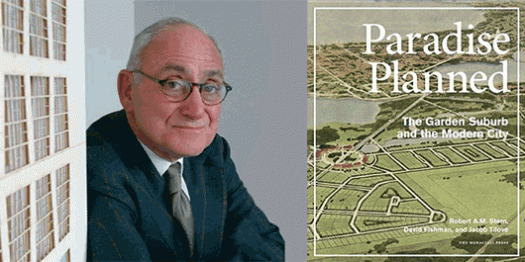A Placemaking Journal
CNU 22 Buffalo: Gearing up for another Stern talkin’ to
Urban circles echoed with the sound of jaws collectively hitting the floor recently, as the Congress for the New Urbanism made the unexpected announcement that famed architect Robert A.M. Stern would be dropping by CNU 22 in Buffalo to make the case for how the lessons of garden suburbs — which he explores in his new book, “Paradise Planned” — can guide both exurban and inner-city (re)development moving forward.
On the face of it, the announcement seems a perfectly reasonable, perhaps even predictable, fit. Stern’s 250-person firm played a prominent role in Disney’s master-planned Celebration; he’s a recipient of CNU’s Athena Award, “issued in honor of those who have cast a lasting and enduring influence on the practice and thought of New Urbanism;” and he’s been characterized by CNU co-founder Andrés Duany as having “turned Yale School of Architecture into the most open-minded architecture school in the United States.”
So why the general sense of disbelief, befuddlement and all around head scratching?

Well, some might recall the last time Mr. Stern dropped by CNU — 2007 in Philadelphia — and raised no shortage of eyebrows with an exuberant, and unexpected, critique of his hosts. Reported Philip Langdon in the New Urban News:
“The most bizarre event in this May’s Congress for the New Urbanism was a Saturday evening speech in which Robert A.M. Stern lambasted new urbanists for producing results he judged to be far below his standards. It was a very odd lecture, one that left much of the audience in Philadelphia’s Kimmel Hall incensed.”
“Stern took the podium and argued for [..] 40 minutes that New Urbanism is failing dismally to achieve its mission. He charged that new urbanists are building on the suburban fringe when they ought to ‘tackle the urbanism of long-established cities.’ He accused new urban developments of lacking the quality associated with the Garden City movement. ‘We have come nowhere near to the achievements of our predecessors,’ Stern declared.”
Langdon’s header for the article? “With friends like these…”
Bring it on
It may seem a little counter-intuitive for CNU to extend a warm howdya-do after being unexpectedly whacked in the face but that’s actually the new urbanist way. And it’s one of the things that’s kept me engaged with the organization over the years.
In short, if your ideas can’t stand up to scrutiny and debate, then there’s probably not a whole lot to them. New urbanists embrace the contrarian, sometimes learning from them and other times winning the day through the fact that, despite any weak executions that may exist on the ground, we’re rooted in historic principles that have proven — in many ways indisputably — to work.
Perhaps you recall CNU 19 in Madison, Wisconsin, when Andrés went head-to-head with Charles Waldheim over Landscape Urbanism. Or CNU 20 in West Palm Beach, Florida, when he sparred with Dan Solomon over prescriptive coding. For many, myself included, these moments were high points in CNU’s history, illustrating just how challenging and entertaining the organization’s yearly event could be.
And thus, at least so far as far as I’m concerned, the ideological battle is won. And we won it. What’s important now, moving forward, is the ongoing debate over the details. Over how these rediscovered principles, these lessons of history, might best be leveraged as we take on the decidedly distinct challenges of life in the 21st century. And to that end, I’m very much looking forward to what Mr. Stern has to say. (And keep in mind that Andrés has his own book on garden cities…)
I hope Mr. Stern throws down. But only because I know it’s destined to be picked up and thrown right back.
Game on! CNU registration is gearing up now.
–Scott Doyon
If PlaceShakers is our soapbox, our Facebook page is where we step down, grab a drink and enjoy a little conversation. Looking for a heads-up on the latest community-building news and perspective from around the web? Click through and “Like” us and we’ll keep you in the loop.









